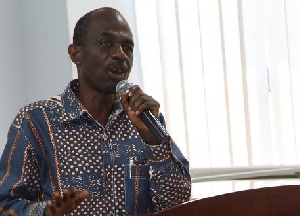 General Secretary of the National Democratic Congress, Johnson Asiedu Nketiah
General Secretary of the National Democratic Congress, Johnson Asiedu Nketiah
The General Secretary of the National Democratic Congress (NDC), Johnson Asiedu Nketiah, has criticised the Minority in parliament over what he says is its move to get parliament to override the constitutional mandate of the Commission on Human Rights and Administrative Justice (CHRAJ).
According to him, “in a democracy there is dictatorship by the law”. He holds the view that when the law mandates certain constitutional bodies to undertake certain responsibilities, “you do not go there and conduct yourself in ways that will take the authority of those bodies from discharging their constitutional responsibilities”.
He was reacting to the Minority caucus who moved a motion for the establishment of a parliamentary committee to investigate President John Mahama for misconduct by accepting a Ford SUV from Burkinabe contractor Djibril Kanazoe, who was in turn awarded numerous contracts by the government of Ghana.
The Speaker of parliament, Edward Doe Adjaho, threw out the motion of inquiry filed by Minority legislators.
In dismissing the motion, Mr Adjaho told the house that a search by the clerk of parliament indicated that CHRAJ had received three separate petitions concerning the same issue involving the Ford gift and was looking into the matter.
Mr Adjaho told the house: “After a careful study of the correspondence from CHRAJ, I have come to the conclusion that the matter is not different in material, in particular from the matter under investigation by CHRAJ.”
He indicated that Article 287 of the constitution of Ghana gave CHRAJ the power to investigate matters relating to the breach of conduct involving public officers, for which reason it would not be proper for parliament to take up an issue already being investigated by another body mandated by the constitution to perform such duties.
“It is my view, therefore, that CHRAJ is the institution with exclusive constitutional authority to deal with all relevant matters relating to the breach of conduct of public officers including the matter involving the Ford Expedition vehicle,” he explained.
Mr Nketiah maintained that this was not the time to “experiment with bipartisan committees” as such did not exist in the constitution. Thus, he said the actions of the minority amounted to “an abuse of parliamentary process”.
He advocated an amendment of parliamentary proceedings to give the Speaker of parliament the power to examine the reasons for any parliamentary summons to prevent needless recalls of the house in future.
Meanwhile, Minority Leader Osei Kyei-Mensah-Bonsu, who addressed a press conference shortly after the house suspended its sitting, described the verdict of the Speaker of Parliament as impulsive considering the fact that the house did not even debate why parliament had to summon legislators for an urgent gathering.